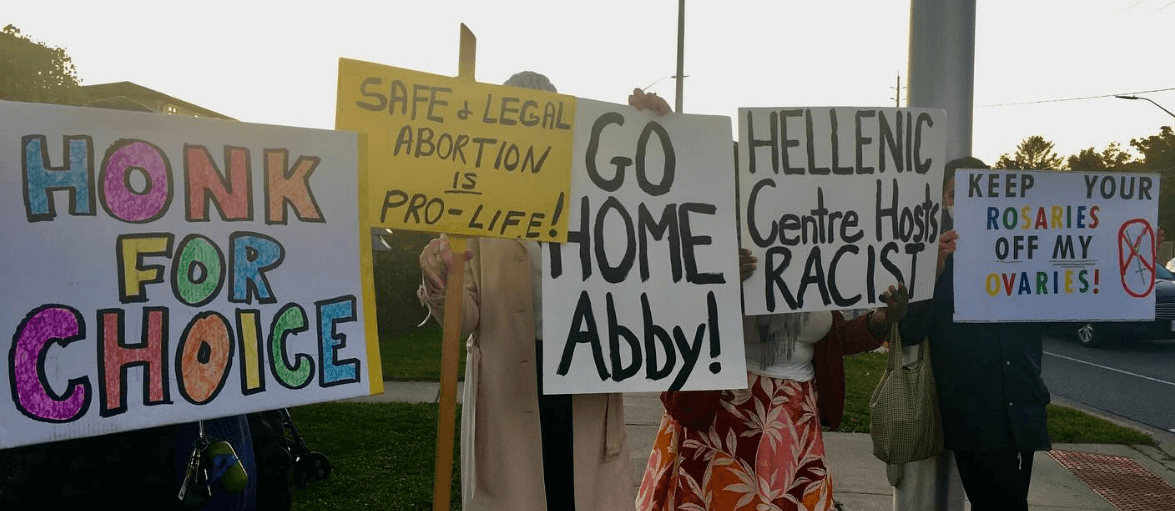
Image: Abortion rights protest 24 October 2024. PHOTO: London Reproductive Justice (Facebook), Ontario, Canada
On 24 October, an abortion rights protest clustered at the intersection of Southdale Road West and Notre Dame Drive. Five protesters stood in a line. Three held familiar abortion rights signs. The remaining two were protesting the Hellenic Community Centre’s decision to serve as a venue for a fundraiser featuring a US anti-abortion spokesperson and was organized to fund “the efforts and message of LIFE in Southwestern Ontario”. Tickets were $75 each.
“It’s reprehensible that any organization in London, public or private, would host a racist, anti-abortion, anti-vaccine person as a key speaker in their centre. I’m incredibly disappointed in the Hellenic Centre’s choice,” said Deanna Ronson, board member of Abortion Rights Coalition of Canada, in an official statement. “I urge Londoners to consider contacting the Hellenic Centre to voice their outrage and even consider boycotting them in the future. We need more love in London, not people who are going to bring in more US-style propaganda against basic human rights.”
The speaker rose to prominence as an anti-abortion spokesperson in 2009 following her heavily-contested recollection of seeing a 13-week old fetus “fighting for its life” during an ultrasound-guided abortion at a Planned Parenthood clinic. “I saw a baby on the screen,” Johnson said in 2009 on Fox News, reported in a Texas publication. “I saw the probe going into the woman’s uterus, and then at that moment, I saw the baby moving and trying to get away from the probe. And I thought, it’s fighting for its life…(It) showed me the reality of abortion: that it ends a child’s life.”
A journalist from The Texas Monthly identified gaping holes in this story. On the day that Johnson reported her experience, the Planned Parenthood’s records did not show that any ultrasound-guided abortions were performed; or that Johnson watched any abortion procedure, or that any patient was 13 weeks pregnant.
But the imagery of a fleeing fetus formed the crux of Johnson’s memoir, Unplanned, which escalated into a film of the same name. In an article by Huffpost, Ob-Gyn Jen Villavicencio criticizes the film for “inaccurate and fear-mongering” depictions of abortion. “The idea that a fetus would recoil or show fear or try to run away from a cannula is really a frank falsehood,” she said, noting that a fetus at 13 weeks in utero cannot make voluntary movements. “All the evidence says that is not possible.”
The article slams Unplanned for sensationalizing abortion “like a horror movie”. Clips from the film were rampant with blood “pooling in socks, dripping on floors”. One scene shows a woman curled up on a bathroom floor, recoiling from a blood-filled toilet after taking an abortion pill. Planned Parenthood, a non-profit charity, is villainized as a for-profit business that “sells abortions”.
“I think only anti-choice people will enjoy seeing the film because it wallows in fetal gore – which is why it got slapped with a ‘Restricted’ rating in the US,” said ARCC Executive Director Joyce Arthur in 2019.
Three of the abortion rights advocates protesting Johnson’s presence in London, including Ronson, first met five years ago while protesting the screening of the film at a local cinema, where they gave out evidence-based information about abortion that rejected the film’s manipulative propaganda.
Ronson is opposed to Johnson’s presence, which drags US-style anti-abortion ideologies into Canadian politics….
Canada is [one of the few] countries in the world in which abortion is legal at any stage of pregnancy. This legalization occurred in 1988 after over a century of heated legal discussions, abortion rights movements, and the rise of clinics that performed then-illegal abortions. In 1970, 30 women advocating for abortion rights chained themselves to the House of Commons’ parliamentary gallery, shutting down Parliament for the first time in Canadian history. From 1977 to 1983, abortion rights advocate Dr Henry Morgentaler illegally opened abortion clinics across Canada and faced an oscillation of convictions and acquittals. In 2008, he was honoured with an appointment to the Order of Canada for his human rights work.
The legal discussions about abortion revolved around the question of fetal personhood. In 1989, legislator Joseph Borowski opposed abortion on the grounds that it “contravened the life and security and the equality rights of the fetus as a person, protected by Section 15 of the Canadian Charter of Rights and Freedoms”. The Court concluded that the Charter did not apply to a fetus since; according to the Criminal Code of Canada, a child “becomes a human being… when it has completely proceeded, in a living state, from the body of its mother”.
Since 2007, there have been six attempts to reopen legal discussion on abortion rights in Canada – all of which would have led to restricting abortion rights. In 2012, there was an attempt to revise Canada’s legal definition of when a fetus becomes a human being.
A 2017 report by the Abortion Rights Coalition of Canada, well worth reading in full today, explains that bestowing personhood onto a fetus threatens the rights of women: “If we give any legal rights to a fetus, we must automatically remove some rights from women, because it’s impossible for two beings occupying the same body to enjoy full rights,” reads the report. “If we try to “balance” rights, it means the rights of one or both parties must be compromised, resulting in a loss of rights. Legally speaking, it would be very difficult to justify compromising women’s established rights in favour of the theoretical rights of fetuses.” [The article continues at length….]
SOURCE: Antler River Media, by Incé Husain, 4 November 2024



